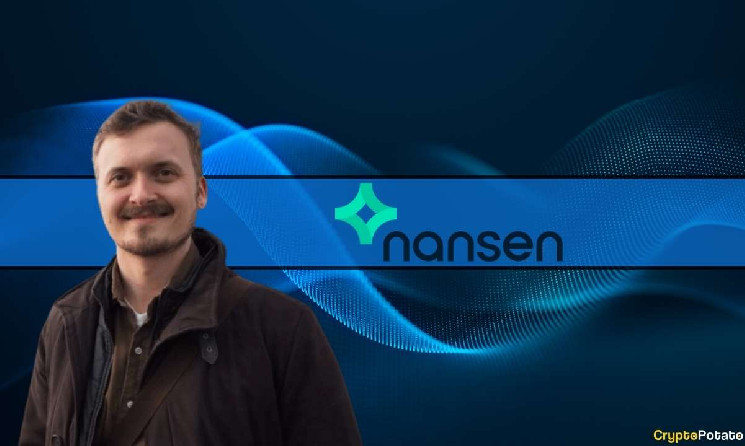In the rapidly evolving world of blockchain and cryptocurrency, understanding the on-chain metrics can be challenging. Navigating this maze, Alex Svanevik, CEO of Nansen, offers a beacon of clarity. His platform, established in 2019, is dedicated to tracking on-chain movements, providing users with a clearer picture of the crypto realm.
In an interview with CryptoPotato that was held during Token2049 in Singapore, the Nansen CEO discusses what Nansen is about and what made it become one of the biggest on-chain data companies, if NFTs will ever come back, and how, where will the next hype come from (after Defi and NFTs), and where it all began for him, personally.
From Getting Laid Off to Establishment of Nansen
Reflecting on his journey, Svanevik amusingly recollects his initial reservations about Bitcoin in 2013.
“I seriously thought about crypto… and made the big mistake of concluding that I thought Bitcoin was only going to be used by money launderers and criminals,” he chuckles.
But it was Ethereum, discovered by him in 2017, that genuinely captivated him. Drawn to its potential for “permissionless innovation”, he remarks, “if someone’s going to make that new currency, maybe they will build it on Ethereum.”
From his beginnings as a data science manager in Barcelona to an unforeseen layoff in Hong Kong, Svanevik’s journey into the crypto domain has been nothing short of adventurous. These twists of fate pushed him towards crypto consulting and, eventually, the inception of Nansen.
Describing the platform’s unique capabilities, Svanevik points to one of its earliest features, “Token God Mode, which allows you to plug in a token, and then you can see who the buyers of this token are.”
The standout aspect? Nansen’s ability to label wallet addresses (EOAs).
“The unique thing about Nansen is that we have labels on addresses so you can see who the addresses represent,” Svanevik elucidates.

Web3 Games Raising in 2021-22 to Get Released
Basking in the afterglow of the DeFi boom of 2020 and navigating the surging tides of the NFT phenomena, Nansen has steadily carved a niche for itself. Svanevik refers to the platform as “an information super app for anything on-chain.”
When probed about future on-chain trends, Svanevik’s excitement is palpable. He is bullish on Web3 gaming’s horizon and highlights platforms like Friend.tech as game-changers. “Many Web3 gaming projects raised money in 2021 or 2022… So now we’ve gotten to the point where these games are ready to get launched,” he anticipates. Additionally, the tokenization of real-world assets, such as T-bills, is on his radar.
Yet, the path to mass adoption of crypto is laden with challenges. Svanevik identifies regulatory hurdles and user experience as dual obstacles.
“Regulation is absolutely one of them… there’s not enough regulatory clarity, especially in the US,” he expresses. On user experience, Svanevik doesn’t mince words, stating, “The user experience is still pretty shit, to put it bluntly.” Elaborating on the pain points, he comments, “The fact that you have to mess with seed phrases… if you’re just a normal person who’s never used crypto is a massive barrier to just usage.”
NFTs: Down But Bright Future
When asked about the prevailing narrative that NFTs (non-fungible tokens) might be facing a downtrend, the Nansen CEO didn’t shy away from the facts. “The reality is that NFT volume is down big time; market caps for the different NFT collections are down,” he said. However, he remains bullish on their future, emphasizing that they “will come back, but they won’t necessarily come back in the same form.”
Indeed, while certain NFT collections have witnessed a decline, others are thriving by expanding beyond the Web3 ecosystem. Svanevik states that the current representation of NFTs as “cartoon animal JPEGs” might merely be the tip of the iceberg. He believes that the infrastructure being developed around NFTs has broader utility, including tokenizing real-world assets.
Expanding on this, he stated:
“If you tokenize your home as an NFT and want to collateralize that and borrow against it, you could use this exact same NFT infrastructure.”
His point underscores the immense potential of NFT technology, far beyond the popularized digital art domain.
Interestingly, the utilization of NFTs isn’t limited to the conventional domains we’re familiar with. Svanevik shared, “In Singapore, the regulator, MAS, wrote a white paper on purpose-bound money (PBMs)… money that can only be used for a specific purpose.” This is a testament to the evolving dimensions of blockchain-based solutions that are capturing governmental interest.
Be Where the Party Is Going On: Nansen’s Goal
At the heart of all this analysis and data is Nansen’s platform. Its primary focus? To be where the “party” is, identifying trends and ensuring they aren’t fleeting “pump and dump” scenarios. The key, the CEO shared, lies in an amalgamation of on-chain data and leveraging an expansive social network.
Discussing Nansen’s approach, Svanevik illustrated, “If you want to understand what’s going to be hot in six months or two years, you have to speak with VCs, angel investors, and builders.” On-chain data reveals present behaviors, while these conversations offer insights into what’s on the horizon.
Moreover, Nansen’s vast tracking ability reveals its commitment to a comprehensive analytic perspective. Yet, the challenge persists in distinguishing between wallets and users. As Svanevik aptly puts it, on-chain addresses are similar to “cookies or sessions” in web analytics, offering an approximation but not a definitive user count.
Ending the interesting conversation on a forward-looking note, Alex teased about “Nansen 2.0,” an upcoming product touted to be 10-100 times faster, built with a multi-chain-first approach. Offering personalized experiences and leveraging more AI, it promises to revolutionize on-chain analytics further.
 cryptopotato.com
cryptopotato.com